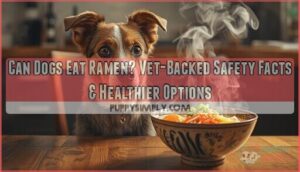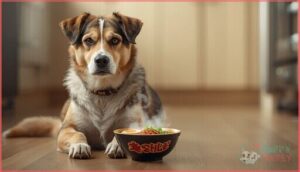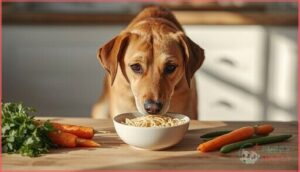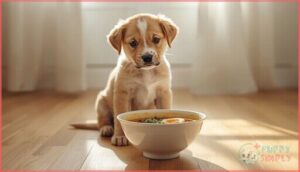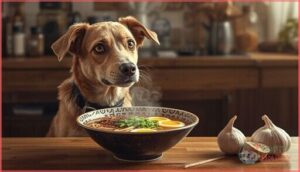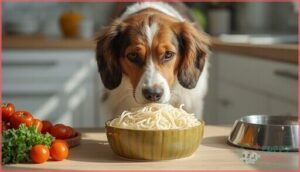This site is supported by our readers. We may earn a commission, at no cost to you, if you purchase through links.
You’d be hard-pressed to find a dog that doesn’t perk up at the smell of ramen. The salty steam, the crinkle of the packet—your pup’s nose knows when you’re about to eat.
But here’s the twist: what looks like a harmless noodle snack can pack a punch that’s anything but friendly to canine health. Ramen’s high sodium, mystery seasonings, and empty calories add up to risks most pet owners never see coming.
If you’ve wondered whether dogs can eat ramen, it’s time to untangle the facts and protect your four-legged companion from hidden dangers.
Table Of Contents
- Key Takeaways
- Can Dogs Eat Ramen Noodles?
- What Ingredients in Ramen Are Harmful to Dogs?
- How Does Ramen Affect a Dog’s Health?
- Are Plain Ramen Noodles Safe for Dogs?
- What Happens if a Dog Eats Ramen Accidentally?
- Can Puppies Eat Ramen Noodles?
- Is Ramen Broth Safe for Dogs?
- Are There Healthier Noodle Alternatives for Dogs?
- Why Human Foods Like Ramen Should Be Avoided
- When Should You Contact a Veterinarian?
- Frequently Asked Questions (FAQs)
- Is ramen okay for dogs to eat?
- Are dogs allowed 2 minute noodles?
- What are symptoms of ramen poisoning in dogs?
- Is there a ramen for dogs?
- Can dogs eat instant ramen?
- Is it healthy to have ramen noodles?
- Can dogs eat ramen noodles?
- Can dogs eat organic Ramen?
- What happens if a dog eats too much Ramen?
- Why does my dog have kidney failure after eating ramen?
- Conclusion
Key Takeaways
- Ramen noodles are risky for dogs due to high sodium, toxic seasonings like garlic and onion, and empty calories.
- Even small amounts of ramen can cause dehydration, upset stomach, or salt poisoning, especially in smaller dogs and puppies.
- Plain noodles offer little nutrition and should never replace dog food, while seasoned or brothy versions are even more dangerous.
- Safer options for treating your dog include homemade, dog-specific snacks or plain cooked rice noodles in moderation.
Can Dogs Eat Ramen Noodles?
Can dogs eat ramen noodles? Technically, a few bites won’t immediately poison your pup, but that doesn’t make it safe. Both instant ramen and restaurant-style bowls are unhealthy choices for dogs because of high salt, heavy seasoning, and empty calories.
If you’re curious about other grains, .
Veterinarians and pet nutrition experts agree: ramen shouldn’t be part of your dog’s normal diet. Quality commercial dog food already provides all the nutrients your pet needs, so adding ramen only displaces balanced nutrition with low-quality filler.
If your dog sneaks a small lick by accident, you’ll probably just see mild stomach upset—or nothing at all. But repeated feeding can lead to chronic problems like high blood pressure, kidney stress, and weight gain. Treat ramen as an accident, not a snack.
Certain ingredients in ramen, like high sodium content, can put your dog’s health at significant risk over time.
What Ingredients in Ramen Are Harmful to Dogs?
Ramen isn’t just unhealthy for dogs—it’s loaded with ingredients that can actually harm them. From excessive salt to outright toxic seasonings, that innocent-looking bowl contains several red flags you need to know about.
Let’s break down the biggest offenders hiding in those convenient little packets.
High Sodium Content
Most instant ramen packets pack 1.5 to 2 grams of sodium—far more than your dog should have in a day.
Dogs only need about 100 milligrams of sodium per 30 pounds of body weight daily, so even a small serving can throw off their electrolyte balance, trigger dehydration risks, and in extreme cases lead to salt poisoning or high blood pressure.
It’s also important to note the dangers of ingredients commonly found in ramen, such as garlic and onion powder, which can be toxic to dogs.
Garlic and Onion Powders
Beyond sodium, ramen flavor packets often contain garlic and onion powders—both toxic ingredients for dogs. These Allium toxins damage red blood cells over time, potentially causing hemolytic anemia where your dog’s body can’t carry oxygen properly. Even small amounts add up, especially since symptoms like weakness and pale gums may not appear for several days after canine poisoning occurs.
- Garlic and onion are concentrated toxic foods for dogs, even in powder form
- Allium toxins destroy red blood cells and trigger food toxicity
- As little as 15–30 grams of raw onion per kilogram can harm dogs
- Signs of poisoning include weakness, pale gums, and rapid breathing
- Check ramen labels—any mention of garlic or onion means it’s unsafe
MSG and Artificial Flavors
Many seasoning packets also load up on monosodium glutamate (MSG) and artificial flavors to boost taste. These flavor enhancers offer zero nutritional value and can trigger neurological effects—restlessness, disorientation, even convulsions—in sensitive dogs.
Chemical additives bundle MSG with preservatives that irritate stomachs, while spicy blends worsen food sensitivities. Your dog’s liver and kidneys don’t need that extra load from toxic ingredients.
Fats and Oils
Oily broths and greasy toppings make ramen rich for you, but that fat intake hits your dog’s pancreas hard.
High fat meals spike pancreatitis risk, a painful inflammation worsened by oils, butter, and fatty scraps.
Even if the noodles are lean, broth, seasoning, and grease effects combine into a dangerous mix—especially for dogs already managing sodium, MSG, or garlic exposure.
How Does Ramen Affect a Dog’s Health?
Feeding your dog ramen noodles can trigger a cascade of health problems, from immediate stomach upset to serious long-term complications.
The combination of excess sodium, toxic seasonings, and empty carbs puts strain on multiple body systems at once. Here’s what happens when ramen enters your dog’s digestive system and why veterinarians consistently advise against it.
Salt Poisoning and Dehydration
Salt poisoning strikes when ramen’s massive Sodium Load—up to 2000 mg per packet—overwhelms your dog’s Fluid Balance. That Sodium Intake pulls water from cells, triggering Dehydration Symptoms like dry gums and excessive thirst.
Severe cases escalate to Hypernatremia, where Electrolyte Shift causes Brain Swelling and neurological chaos:
- Confusion and disorientation
- Muscle tremors
- Seizures
- Life-threatening Salt Toxicity
- Rapid water consumption worsening swelling
Even one salty meal can tip small dogs into dangerous territory.
Digestive Issues
Seasoned ramen irritates your dog’s stomach lining, often causing vomiting or diarrhea within hours—especially in smaller breeds with sensitive Gut Health.
The salty broth draws extra fluid into the intestines, loosening Bowel Movements and worsening dehydration. Dogs unfamiliar with fatty, heavily seasoned foods face acute Digestive Issues: gassiness, belly discomfort, and temporary appetite loss.
Repeated Stomach Problems can even inflame the pancreas over time.
Weight Gain and Obesity
Sharing calorie-dense ramen adds extra calories on top of your dog’s regular meals, tipping them into a daily surplus that gradually packs on pounds.
Those Calorie Intake overages strain joints and raise Obesity Risks—think arthritis, diabetes, and heart disease down the road.
Weight Management means sticking to a balanced Dog Diet with Healthy Alternatives, not salty noodle snacks that threaten long-term Canine Health.
Allergic Reactions
Ramen often contains wheat, soy, and other common allergens that can trigger Food Allergies in dogs. You might notice Skin Reactions—itching, redness, or hives—after your pet eats it.
Severe cases can escalate to Anaphylaxis, though that’s rare. If you suspect food sensitivities in dogs, Sensitivity Tests from your vet help pinpoint triggers and prevent future Allergic Reactions.
Are Plain Ramen Noodles Safe for Dogs?
Plain noodles without any seasoning might seem harmless, but they’re still not a great choice for your dog. They offer almost nothing in terms of nutrition and come with a few concerns you should know about.
Let’s break down what plain ramen noodles really mean for your dog’s health.
Nutritional Value of Plain Noodles
Even without seasoning, plain ramen noodles bring little to your dog’s table. Consider what they actually deliver regarding canine dietary needs and nutritional balance.
- Carb content sits around 25–27 grams per 100 grams cooked—mostly refined starch load with minimal fiber benefits
- Protein levels hover at just 4–5 grams per 100 grams, far below what active dogs need
- Mineral profile offers scant calcium, potassium, or magnesium
- Calories run high at 130–140 per 100 grams, yet nutritional payoff stays low
- Fiber barely registers, often under 3 grams per serving
This dog nutrition guide bottom line? Plain ramen noodles deliver empty energy without supporting your pet’s health.
Occasional Treats Vs. Regular Feeding
Your dog won’t suddenly fall ill from one tiny taste of plain noodles, but don’t let that become a pattern. Treat frequency matters more than you might think.
Feeding guidelines for dogs recommend keeping all treats—including these empty carbs—under 10 percent of daily calories. Regular feeding disrupts nutritional balance, crowds out proper dog nutrition, and sets up long-term pet safety issues. Healthy alternatives beat ramen every time.
Portion Size Considerations
How much is too much? For small dogs under twenty pounds, one tablespoon of plain noodles hits their daily sodium limit.
Medium-sized dogs shouldn’t get more than a few strands. Even large breeds risk salt overload from a full human serving.
Safe serving sizes matter because meal planning tips that work for you won’t protect your dog’s health.
What Happens if a Dog Eats Ramen Accidentally?
If your dog snatches a bite of ramen when you’re not looking, don’t panic—most dogs won’t experience severe issues from a small amount.
What happens next depends on how much they ate, what ingredients were in it, and how sensitive your dog is to sodium and seasonings. Let’s walk through what symptoms to watch for, when to worry, and exactly what steps to take right away.
Mild Symptoms to Watch For
Notice your dog stretching more, pacing, or resting quietly after a ramen mishap? Watch for mild digestive issues—soft stool, gas, or a single bout of vomiting.
Thirst changes and extra urination hint at dehydration signs. Energy shifts, like being less playful, and small skin reactions or itching, can signal early salt poisoning or salt toxicity. Most symptoms fade within 24 hours.
Severe Reactions and Emergency Signs
If your dog starts staggering, vomiting repeatedly, or seems disoriented after eating ramen, you’re facing signs of salt poisoning or toxic ingestion. Emergency care is needed if you spot:
- Canine seizures or muscle tremors
- Sudden collapse, pale gums, or glassy eyes
- Rapid breathing, extreme thirst, or refusal to drink
Vet advice is urgent—these symptoms signal salt toxicity or kidney failure.
Immediate Steps to Take
First things first—Stay Calm. Assess the situation: how much ramen, what ingredients, and when. Remove access to leftovers, clean up spills, and offer comfort with fresh water.
Monitor symptoms of poisoning—vomiting, lethargy, odd behavior. If you spot canine health risks, call for veterinary advice.
Here’s a quick table for reference:
| Step | Action | Why Important |
|---|---|---|
| Stay Calm | Breathe, observe | Clear thinking |
| Remove Access | Clean up | Prevent more ingestion |
| Offer Comfort | Water, rest | Reduce salt poisoning |
| Monitor | Watch symptoms | Spot dog health concerns |
Can Puppies Eat Ramen Noodles?
Puppies have unique needs that make them especially sensitive to certain foods. Ramen noodles can pose extra risks for young dogs, beyond what adult dogs might face.
Here’s what you should know before considering any noodle treats for your puppy.
Risks for Young Dogs
Think your puppy can handle a noodle or two? Think again. With immature kidneys, puppies can’t clear out salt like adults, making them sitting ducks for salt toxicity.
Ramen’s heavy seasoning and fats also spell trouble—digestive issues, vomiting, even pancreatitis risk. In the context of Puppy Nutrition, stick to foods designed for canine dietary restrictions. The risks of feeding ramen to dogs aren’t worth it.
Ramen’s rich seasonings and fats can trigger digestive upset and pancreatitis in puppies, making it a risky choice for their nutrition
Developmental Concerns
Development is a delicate dance for puppies—one misstep, like ramen, can throw everything off.
Neurological risks spike with sodium swings, while skeletal growth suffers from mineral imbalances.
Organ damage isn’t just theory; young kidneys and hearts can’t keep up.
Add in poor growth patterns and behavioral effects, and it’s clear: ramen simply doesn’t fit the nutritional needs or dietary sensitivities of puppies.
Is Ramen Broth Safe for Dogs?
Ramen broth might seem harmless, but it’s packed with ingredients that can spell trouble for your dog.
Before you share a sip or a spoonful, it’s important to know what’s really inside.
Let’s break down the risks and safer options you should consider.
Sodium and Seasoning Risks
Ever wondered why ramen broth packs such a punch? It’s the Sodium Intake and Seasoning Dangers—especially from those concentrated seasoning packets.
Toxic Ingredients like MSG, garlic, and onion make ramen risky for dogs. Too much sodium can trigger Salt Poisoning or Salt Toxicity. If you’re after safe Pet Nutrition, skip the broth and seek Ramen Alternatives instead.
Homemade Vs. Store-Bought Broth
Want to sidestep hidden Dog Health Risks? Homemade Recipes give you full control over Broth Ingredients and Cooking Methods. Store-bought broths often sneak in sodium, onion, and preservatives—bad news for Pet Safety and Nutrition for Dogs.
When you’re picking broth for Ramen Noodles, consider these:
- Homemade bone broth
- Pet-specific broths
- Plain meat stock
- No-salt added broths
- Simple veggie broths
Are There Healthier Noodle Alternatives for Dogs?
If you’re looking for safer noodle options for your dog, you’ve got a few choices beyond ramen.
Some are easier on their stomach and fit better with their dietary needs.
Let’s take a look at what works.
Rice Noodles
Looking for a noodle swap that won’t trip up your dog’s digestion? Rice noodles are a gentle, gluten-free option—easy to chew, easier to digest, and free from the sodium overload found in instant ramen.
They’re not packed with nutrition, but as a rare treat, they fit the bill for noodle safety and pet wellness. Just keep portions small.
Plain Cooked Pasta
If your dog’s hoping for a noodle fix, plain cooked pasta is a safer bet than ramen—but it’s still mostly empty calories. Pasta nutrition is heavy on carbohydrates and light on the protein dogs need.
Offer small pieces, soft and unsalted, to protect dog digestion and pet safety. For dogs with wheat sensitivity, grain alternatives remain the smarter choice.
Dog-Friendly Homemade Treats
Homemade dog treats can fill the noodle gap with safer, tastier options. Instead of empty carbs, you can whip up healthy canine snacks using Peanut Butter Recipes or Oat Flour Treats.
Try these:
- Pumpkin Puree Benefits (moisture, fiber)
- Homemade Dog Biscuits (no salt or onion)
- Safe treats for dogs (no xylitol)
- Alternative dog treats (grain-free)
- Canine nutrition (balanced ingredients)
Why Human Foods Like Ramen Should Be Avoided
Dogs and people don’t share the same dietary needs, so sharing ramen isn’t as harmless as it seems.
Human foods like ramen can cause problems for your pup, even in small amounts. Here’s what you need to know before slipping your dog a bite from your bowl.
Differences in Nutritional Needs
Species specificity matters—a dog’s nutritional needs aren’t a copy-paste from your own. Canine nutrition calls for strict protein requirements, careful nutrient balance, and unique dietary restrictions.
For instance, the nutritional needs of dogs demand more protein and less sodium than most human meals, including ramen. That’s why canine dietary recommendations always stress dog nutrition formulated for their bodies, not ours.
Risks of Feeding Table Scraps
Now, when you stray from canine dietary recommendations and share table scraps like ramen, you invite trouble. Risks of feeding dogs human food stack up fast.
Here’s what you’re up against:
- Salt poisoning and toxic ingredients for dogs
- Food allergies and digestive upset
- Weight gain that undermines dog wellness and long-term Pet Nutrition
Dog food safety isn’t just a suggestion—it’s a lifeline.
When Should You Contact a Veterinarian?
If your dog managed to sneak some ramen, knowing when to call the vet can make all the difference.
There are clear signs and steps you should watch for after accidental ingestion. Let’s walk through what to look out for next.
Signs of Salt Toxicity
Ever notice your pup suddenly draining the water bowl and seeming “off” after a salty snack? Salt poisoning hits fast. Watch for vomiting, diarrhea, staggering, or tremors—these Toxicity Symptoms mean Canine Dehydration and Sodium Imbalance are already in play. When in doubt, act fast.
Here’s a quick guide:
| Early Signs | GI Symptoms | Neurological Clues |
|---|---|---|
| Excessive thirst | Vomiting | Tremors |
| Lethargy | Diarrhea | Confusion |
| Loss of appetite | Drooling | Unsteady walking |
Monitoring After Ingestion
Vigilance is your best ally after ramen mishaps. For Pet Safety, keep a close eye on your dog for Toxicity Signs and digestive issues—especially during the first 12–24 hours.
Vet Guidance suggests tracking these:
- Water intake and thirst
- Lethargy or withdrawal
- Vomiting or diarrhea
- Appetite changes
- Unusual behavior or balance issues
Emergency Care is warranted if symptoms worsen.
Preventing Future Incidents
One smart move? Safe Food Storage—keep ramen and salty snacks locked away. Pet Proofing goes beyond baby gates: use latched cabinets and secure trash bins.
Dog Training matters, too; reinforce “leave it” and reward with Healthy Alternatives. Accident Prevention starts with everyone understanding dog food ingredients and puppy dietary needs. Choose safe alternatives for dog treats to protect your pup’s health.
Frequently Asked Questions (FAQs)
Is ramen okay for dogs to eat?
Oddly enough, what’s tasty for you can spell trouble for your dog.
Ramen noodles and dog safety don’t mix—high sodium, risky seasonings, and zero nutrition make ramen toxicity a real concern.
Veterinary advice? Stick with healthy snack options.
Are dogs allowed 2 minute noodles?
Dogs aren’t allowed 2 minute noodles—these instant ramen meals are a poor choice for canine health.
Noodle toxicity, high sodium, and risky seasonings make them unsafe.
For pet nutrition, stick to dog-safe treats and healthier noodle alternatives.
What are symptoms of ramen poisoning in dogs?
Symptoms of ramen consumption in dogs include vomiting causes, diarrhea, dehydration signs like excessive thirst, lethargy effects, and gastro issues.
Neurological damage can appear with salt toxicity or food toxicity—think confusion, tremors, or seizures—putting canine health at risk.
Is there a ramen for dogs?
Did you know dog ramen brands like Pat Pat Noodles and Ansim Daengmyeon use air-dried noodles and salt-free broths?
These Dog Ramen Options are crafted for Pet Noodle Safety, addressing Canine Diet Needs and Dog Food Innovations.
Can dogs eat instant ramen?
Instant ramen noodles aren’t safe for dogs. High sodium, mystery seasonings, and empty carbs all spell trouble for canine health.
Even plain ramen noodles add no nutritional value—so skip them for better pet safety and nutrition.
Is it healthy to have ramen noodles?
Ramen noodles, especially instant varieties, fall short on Nutrient Balance, loaded with sodium and lacking real Nutritional Benefits.
For Healthy Eating and Food Safety—human or dog—Ramen Alternatives offer more nourishment and support Dog Nutrition and Pet Food Safety goals.
Can dogs eat ramen noodles?
Dogs shouldn’t eat ramen noodles. The high sodium, fats, and seasoning packets make them a poor choice.
For canine health risks, stick to safe snack options. There are better alternatives for treats—your dog deserves food made just for dogs.
Can dogs eat organic Ramen?
Even if you dress up noodles in organic robes, the risks remain.
Organic Ramen Risks include high sodium and seasonings unsafe for pets.
For Healthy Dog Snacks, stick to Sodium Free Alternatives and treats suited to Dog Nutrition Facts.
What happens if a dog eats too much Ramen?
Too much ramen can cause sodium overload, pushing your dog toward salt toxicity—think vomiting, restlessness, or trembling.
Ramen toxicity strains canine digestion, risks kidney stress, and may trigger a pet emergency. Short-term symptoms include high blood pressure, diarrhea, and dehydration.
Why does my dog have kidney failure after eating ramen?
Heavy sodium overload, toxic seasonings like garlic and MSG, and fatty broths in ramen slam your dog’s kidneys.
That extra salt and ramen toxins spike kidney stress—sometimes pushing even a healthy pup toward sudden kidney damage or failure.
Conclusion
Exploring the realm of human foods for dogs is much like charting a winding river—clear at first, but hiding strong currents beneath the surface.
Regarding “can dogs eat ramen,” the safest course is steering clear. Every ingredient matters, and just a nibble can send health spinning off course.
The best way to protect your pup? Keep ramen out of their bowl and reach instead for safer treats built with canine well-being in mind.
- https://www.fitpetgo.com/foods/ramen-noodles
- https://furrygreen.hk/blogs/blog/can-dogs-eat-noodles-a-complete-safety-guide-for-pet-parents
- https://www.masterclass.com/articles/can-dogs-eat-pasta
- https://owaowaco.com/blogs/news/ramen-noodles-for-dogs-yes-please-introducing-owa-owas-pup-noodles
- https://www.healthline.com/nutrition/ramen-noodles

